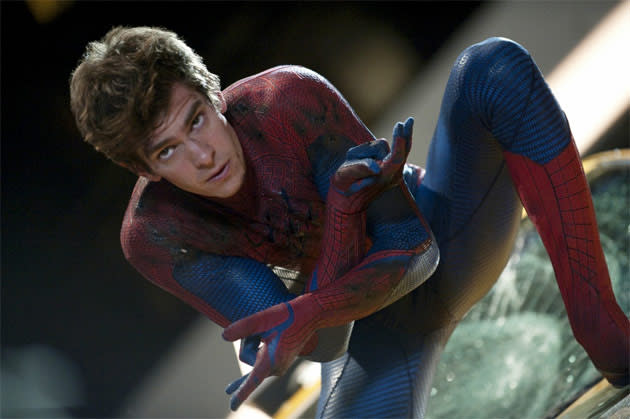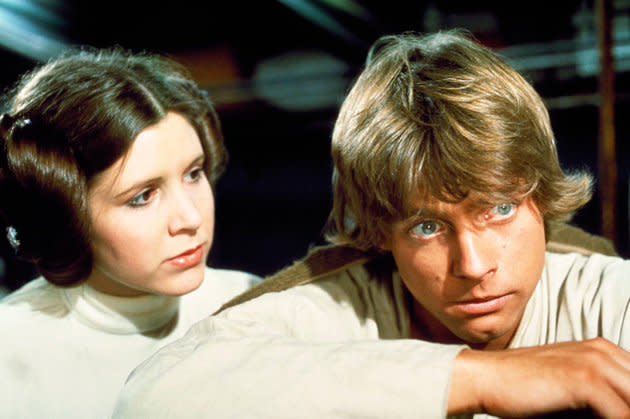 Wide Screen
Wide ScreenWhat does Disney’s acquisition of Lucasfilm mean for the Marvel film universe?

"Star Wars" creator George Lucas' industry-shaking $4.05 billion deal with Disney may be a sound move for the movie mogul, but it also might have unintended consequences for the Marvel superhero movies. There's a lot more at stake here than just Darth Vader and Indiana Jones, and here's why:
Rival studios Walt Disney Pictures and 20th Century Fox (distributors of the "Star Wars" movies) have enjoyed a complex relationship since Disney's 2009 takeover of Marvel Entertainment. You see, Fox owns the film rights to many notable Marvel Comics properties, like "X-Men," "Fantastic Four," and "Daredevil" — characters who now ultimately belong to the House of Mouse. Fox has struggled with these franchises in recent years, with films like "X-Men Origins: Wolverine" and "Fantastic Four: Rise of the Silver Surfer" failing to impress both fans and critics alike.
See also: Fans shocked by Disney-'Star Wars' takeover
Those failures have forced the studio to hit the reset button with planned or already in production reboots. While the "X-Men" series appears to be rebounding with thanks to "First Class," "The Wolverine," and the impending "Days of Future Past" project, other Fox-controlled franchises have fallen victim to studio bumbling.
Just a few months ago, Fox lost the film rights to "Daredevil" and all the associated characters because they could not find a replacement for director David Slade ("The Twilight Saga: Eclipse"), who exited the project in pre-production due to a scheduling conflict. The studio needed to have a "Daredevil" movie in production by October 2012 or else the film rights would revert to their original owners — Marvel/Disney. Despite overtures made by "A-Team" director Joe Carnahan at the last moment, Fox decided to throw in the towel on the project and gave up their rights. Similar obligations are in place for other Marvel Comics properties licensed by Fox, but as long as the studio is able to keep producing movies based on the characters, it will retain those film rights.

On the other side of the coin, Marvel proper has pushed ahead with its ambitious "shared cinematic universe" plan under the ownership of Disney. It's a strategy that resulted in a string of box office smashes and culminated in the meg- hit superhero ensemble "The Avengers" earlier this year. As popular and as profitable as those current Marvel movies are, though, heroes like Iron Man and Captain America are ultimately B-level super beings when compared to more popular characters like Spider-Man and the X-Men. With the rights to those franchises belonging to Sony and Fox, respectively, Marvel and Disney are limited to producing films based on lesser-known, second-tier superheroes like Ant-Man and the Guardians of the Galaxy. They're still great characters, but the fact of the matter is that they will never have the same box office appeal as the web-slinging wall crawler or the mutants of the Xavier Institute.
With the success of Marvel's "The Avengers" and Sony's "The Amazing Spider-Man" over the summer, there was a lot of talk about trying to further integrate the Marvel cinematic universe between the major studios, and there were even rumours of Fox wanting to trade "Fantastic Four" characters like the Silver Surfer and Galactus to get an extension on "Daredevil". The idea of having Hugh Jackman's Wolverine or Andrew Garfield's Spider-Man show up in an "Avengers" sequel already has fans salivating; those kinds of crossovers happen in the comic books all the time, so why not in the movies? Unfortunately though, that sort of cameo would require an enormous amount of wheeling and dealing between Fox, Sony, and Disney.

And now, in light of Disney's multi-billion dollar acquisition of Lucasfilm -- a longtime partner of 20th Century Fox -- the powers that be at Fox now might not be so willing to cooperate.
To put it simply, Fox is the reason that "Star Wars" exists. They produced and distributed the movie that started it all ("A New Hope") way back in 1977. With that in mind, it's not a stretch to say that Fox is also the reason that George Lucas became the head of a multimedia and merchandising empire worth billions. Billions that Disney — not Fox, which enjoyed a 35-year working relationship with Lucas — has now paid to take control of.
See also: Twitter responds to Disney-Lucasfilm takeover with jokes
What's worse is that Lucas, despite his long history with Fox, reportedly didn't even give the studio the opportunity to buy Lucasfilm before selling it to Disney. Between the box office and home video revenue, it's estimated that the "Star Wars" franchise earned Lucasfilm and Fox north of $8 billion dollars over the years — a number that only goes up with each 3D re-release or Blu-ray box set.
However, it's not all bad news for Fox, at least financially. The studio still owns the distribution rights to "A New Hope" in perpetuity -- that means that they legally control it forever! Disney would have to buy those rights from Fox if they ever wanted to do anything with the original film. Fox also has the theatrical, non-theatrical, and home video rights for the five other "Star Wars" movies until May 2020, a fact that will likely complicate Disney's plans to release "Star Wars: Episode 7" in 2015. Again, unless Disney were willing to pony up for those rights, that "Star Wars" complete saga box set tie-in will make Fox a boatload of money in the lead-up to "Episode 7."

If there's one thing Hollywood likes more than money, it's holding grudges. After all, this is the place that coined the phrase "you'll never work in this town again." It's very possible that Disney's takeover of Lucasfilm has created a lot of bad blood between Fox and the House of Mouse. Any inclination or good will Fox might have had about collaborating on potential comic book character crossovers may have evaporated when Lucas signed on the dotted line with Disney.
See also: What Darth Vader sounded like before James Earl Jones
Control of superheroes that Marvel/Disney would desperately like to have combined with all the rights related to the "Star Wars" films put Fox in an extremely strong position. If the studio is still even willing to play ball with Disney on the Marvel front, that galaxy far, far away could easily become billion-dollar bargaining chips in future deals between the two movie powerhouses.

 Yahoo Movies
Yahoo Movies 